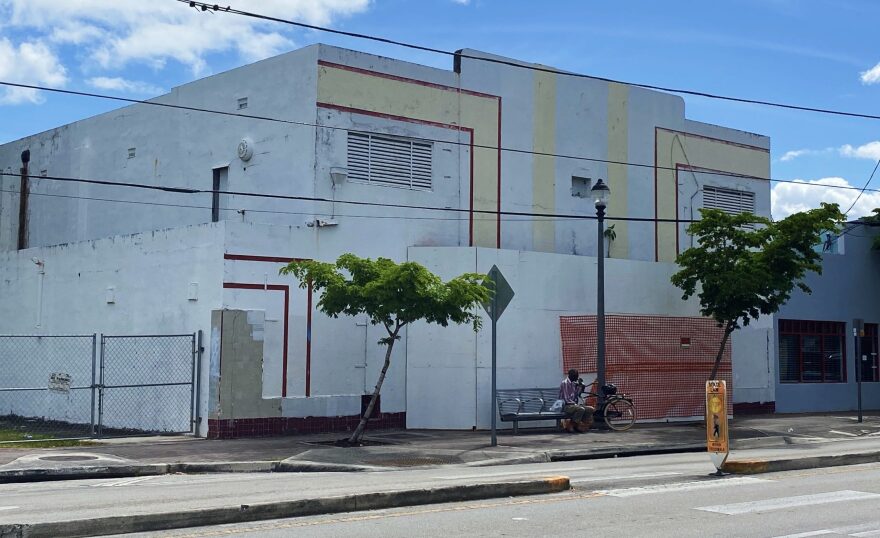In segregation days, the Ace Theater in Coconut Grove was the black community’s showplace for movies and entertainment events. The historic venue served that role from the 1930s into the 1950s and until its closure.
The Ace hosted film, live performances, school graduations — it was even a fallout shelter during the Cuban missile crisis.
Fifty years after its closure, the Ace is owned by Denise and Dorothy Wallace, whose family has lived in the Grove for three generations. The Wallace women have been active in the community for decades. Denise became the first co-chair of the Coconut Grove Village Council in 1992. Dorothy was one of two black women to integrate the University of Miami’s School of Education in 1963.
Their father, Harvey Wallace, bought the shuttered Ace from Wometco in 1975 with the hope of reopening it to again as a focal point of community life in the Black Grove.
And that dream may finally become reality, albeit slowly.
Denise registered the non-profit Ace Theater Foundation Inc. in 2014 to aid her efforts to preserve the building, which was registered as a historical site by the city of Miami in 2008. The U.S. government listed it on the National Register of Historic Places in 2016.
The site’s listing in the National Register describes the theater as a rare, surviving resource from Coconut Grove’s segregated past.
“The Ace Theater was the community theater,” Coconut Grove resident Renita Ross is quoted as saying in the theater’s designation report to the city of Miami’s Historic and Environmental Preservation Board. “Friday evening, after school, my cousin and I couldn’t wait to walk from my grandparent’s home on Florida Avenue to the Ace.”
Under the African American Civil Rights Network Act of 2017, the National Park Service offers donations to nominated and selected sites for preservation purposes. The History of Equal Rights grant program chooses multiple projects every year to receive donations with a total of $5 million dispersed among eight projects in 2024.
The non-profit was awarded a $398,199 grant by the National Park Service in 2021 but has yet to begin the physical rehabilitation efforts that are necessary to have the theater reopened to the public.
READ MORE: Renovations To Lyric Theater, Symbol Of Overtown’s Cultural History, Unveiled
Owner Denise Wallace said that renovating an historic structure is complex, and requires multiple reviews and approvals. First, plans must be developed by architects and approved by the National Park Service, according to Section 106 of the National Historic Preservation Act of 1966 (NHPA). The process is required to ensure nationally recognized historic sites are not degraded by any planned alterations.
The Ace Theater Foundation’s alteration plans are currently in the finalization stage with the National Park Service.
Next, permits must be secured from the city of Miami, which Wallace said has been “wonderful partners” in working with the foundation. The foundation has a hearing scheduled with the National Park Service on May 8.
Wallace said the foundation hopes to begin brick and mortar operations by the end of summer 2024.
“It’s been slow, but it’s coming together,” said Wallace. “…. I’m anxious to continue the work, and the city is anxious to see it happen so we’re working on it.”
Wallace said she hopes the renovated Ace will fulfill the need for a small venue in the city of Miami that can provide cultural arts programming for students, children and adults. She envisions that the then-updated facility will accommodate a variety of events thanks to the planned removal of fixed seating, along with updated bathrooms and improvements that comply with the Americans with Disabilities Act.
She predicts the Ace’s resurgence will be similar to the reopening of The Historic Lyric theater in Overtown, a “colored playhouse” that first opened in 1919 and is currently home to local performances such as concerts, and comedy shows following multiple phases of renovations.
Wallace can’t wait for re-opening day.
“I went to the movies in that theater and I’ll be glad to see the marquee lit and when the ACE speaks again, because right now it’s silent,’’ she said. “There are so many stories people have about the theater and right now it’s not speaking.”
Hennessy Sepulveda is an FIU student who is currently pursuing a bachelor’s degree in Digital Journalism. She obtained an associates in arts in Mass Communications/Journalism from Miami Dade College. She has also worked as a contributing writer for PantherNow.
The story was originally published by Caplin News, a publication of FIU's Lee Caplin School of Journalism & Media, as part of an editorial content partnership with the WLRN newsroom.





